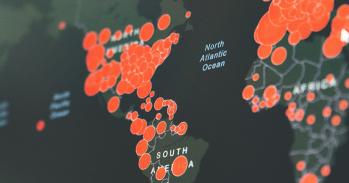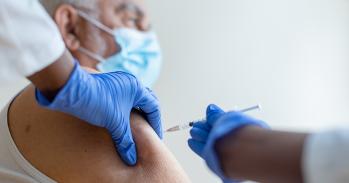
“In many parts of the world people still live with the daily threat of diseases like cholera, typhoid, and malaria. In reality COVID is just another infection,” says Professor Gordon Dougan.
“In many parts of the world people still live with the daily threat of diseases like cholera, typhoid, and malaria. In reality COVID is just another infection,” says Professor Gordon Dougan.
This article is part of a series in which we speak to some of the many Cambridge researchers tackling COVID-19. For other articles about our latest COVID-19-related research, click here.
I run a lab in the Jeffrey Cheah Biomedical Centre (JCBC) on the Cambridge Biomedical Campus, where we study antibiotic resistance and infections. We work closely with Cambridge University Hospitals (CUH), applying genomics to analyse clinical samples. I’m also a strategic advisor to Wellcome, and until recently was spending two days a week at its headquarters in London. I’m now spending all my working time in the JCBC, continuing to work remotely for Wellcome. I’ve worked throughout the lockdown.
My team was involved in setting up COVID-19 testing for healthcare workers, and establishing a containment level 3 facility (designed to safely handle infectious diseases) for this. It was hard work, but I believe it made a major impact on reducing COVID in the hospital and department so it has been very rewarding. The group is now slowly stepping back from testing and returning to our normal work.
I also helped establish the COVID-19 Genomics UK (COG-UK) Consortium for sequencing the virus, together with the Principal Investigator Sharon Peacock. I did a lot of the organisational work, including setting up the grant with the University. This was all done at very short notice. Ian Goodfellow is head of sequencing for Cambridge COG-UK, and has been great at linking with the hospital. We also helped out with the Intensive Care Unit at the peak of the pandemic, looking for secondary infections and antibiotic resistance.
My lab works on the molecular mechanisms involved in infection and resistance to treatments. We use simple models of infection, mostly based around high throughput genomic assays and models based on human stem cells. I also have global connections for my work on typhoid - multiple field sites around the world managed partly through joint funding with the International Vaccine Institute from Gates, EU, and Wellcome. We run projects working on maximising the amount of useful data returned on the analysis of samples, both on these sites and within the Cambridge hospital system.
I’ve been working on epidemics all my life, so in some ways I’ve just carried on as normal. I have always been very careful about things like social distancing and hand-washing when traveling in epidemic areas, so this is quite natural for me and my team. I think it’s now a psychological battle to get back to normality. In many parts of the world people still live on a daily basis with diseases like cholera, typhoid and malaria.
The UK infrastructure was absolutely not ready for COVID-19. We need to learn to adapt and be ready for the next epidemic, because if we carry on the way we are there will be another one and it could be a lot worse, for example by affecting children - who are largely spared by COVID-19.
The research community’s response to COVID-19 could have been better. Obviously the lockdown has meant that it’s very difficult to find people to get anything done. Some people have stepped up and been excellent; others have struggled. We need to learn from this: the multiple levels of administration within organisations need to be simplified. Ironically during the pandemic we were more or less left to get on with things and I’m sure that helped us.
We need a much better local infrastructure both within hospitals and the community. For example, track and test cannot be invented during an epidemic; it has to be in place already. The clinicians, scientists and management within CUH have been fantastic in my opinion, but we need the infrastructure to match. We now have excellent facilities coming online in the JCBC but we need more. We need to re-establish health clinics in the community, and get GPs out of their offices and back out there (this is absolutely not a criticism of GPs, I am sure they would agree!).
When the pandemic is over I’m looking forward to going on holiday and having a meal out with my wife…..and watching Scunthorpe United.
Gordon Dougan FRS is an expert on vaccines and genomics whose distinguished career has included contribution to the development of several vaccines. He is a Professor at the Cambridge Institute for Therapeutic Immunology & Infectious Disease (CITIID) in the Department of Medicine, and is involved in the new Wolfson Interdisciplinary Research Hub in Global Health. He recently wrote a blog on How we lost our collective memory of epidemics.
How you can support Cambridge’s COVID-19 research

The text in this work is licensed under a Creative Commons Attribution 4.0 International License. Images, including our videos, are Copyright ©University of Cambridge and licensors/contributors as identified. All rights reserved. We make our image and video content available in a number of ways – as here, on our main website under its Terms and conditions, and on a range of channels including social media that permit your use and sharing of our content under their respective Terms.




